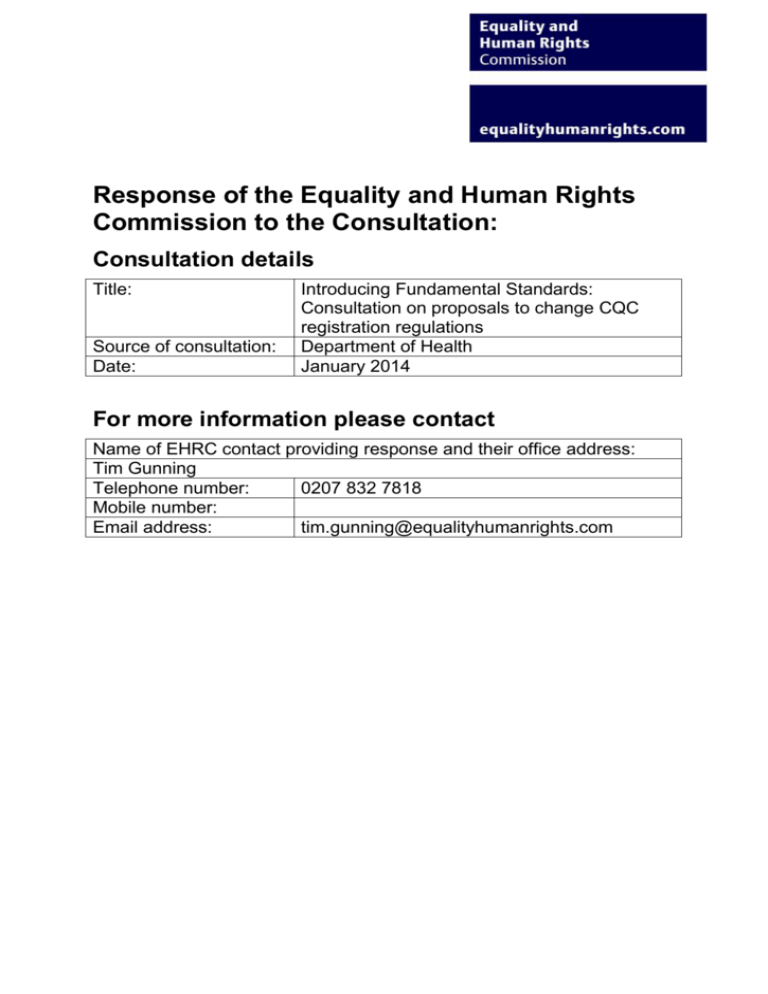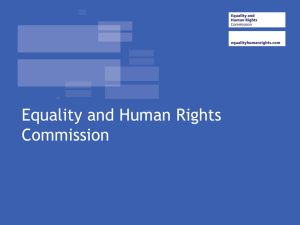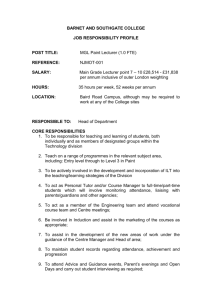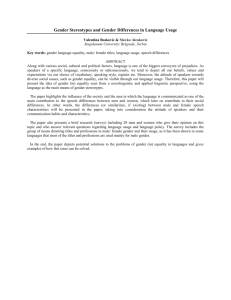the full response - Equality and Human Rights Commission
advertisement

Response of the Equality and Human Rights Commission to the Consultation: Consultation details Title: Source of consultation: Date: Introducing Fundamental Standards: Consultation on proposals to change CQC registration regulations Department of Health January 2014 For more information please contact Name of EHRC contact providing response and their office address: Tim Gunning Telephone number: 0207 832 7818 Mobile number: Email address: tim.gunning@equalityhumanrights.com About the Equality and Human Rights Commission 1. The Equality and Human Rights Commission is a statutory body, established under the Equality Act 2006. Its statutory duties include promoting equality of opportunity, working towards the elimination of unlawful discrimination, and promoting awareness, understanding and protection of human rights. 2. The Commission enforces equality legislation on age, disability, gender reassignment, marriage and civil partnership, pregnancy and maternity, race, religion or belief, sex, sexual orientation, and encourages compliance with the Human Rights Act. It gives advice and guidance to businesses, the voluntary and public sectors, and to individuals. 3. We have a statutory duty under the Equality Act 20061 to encourage and support the development of a society in which: people's ability to achieve their potential is not limited by prejudice or discrimination, there is respect for and protection of each individual's human rights, there is respect for the dignity and worth of each individual, each individual has an equal opportunity to participate in society, and there is mutual respect between groups based on understanding and valuing of diversity and on shared respect for equality and human rights. 4. We are also responsible for monitoring the effectiveness of the equality and human rights enactments and advising on the effectiveness of enactments, as well as the likely effect of a proposed change of law2. 5. As a UN accredited National Human Rights Institution, the Commission is required to ‘promote and ensure the harmonisation of national legislation, regulations and practices with the international human rights instruments to which the State is a party’.3 This includes the European Convention on Human Rights, incorporated in the Human Rights Act 1998. 1 Equality Act 2006, section 3. Equality Act 2006, section 11. 3 Principles relating to the Status of National Institutions (The Paris Principles), Adopted by General Assembly resolution 48/134 of 20 December 1993. 2 Find out more about the Commission’s work at: www.equalityhumanrights.com Consultation response 1. The Commission’s response focuses on how the Fundamental Standards should support and protect the human rights of health and social care users. We have not structured our response around the consultation questions because many of these questions fall outside our remit. 2. The Commission's inquiry into older people and human rights in home care4 found evidence of serious, systematic threats to the dignity, autonomy and safety of older people using home care services. Evidence of human rights breaches from the inquiry included: Some older people receiving inadequate support with food and drink, leading to severe weight loss and dehydration. Although evidence of intentional physical abuse was relatively unusual, several instances were reported. Some older people were neglected because care workers had been allocated insufficient time to complete everything in the care plan; it was common for care visits to be scheduled for only 15 minutes. Problems also arose when workers under pressure carried out their tasks in a distracted and rushed way, with a greater impact for those with dementia. Some older people reported a lack for respect for personal privacy when intimate tasks were carried out, a problem compounded by having a high turnover of care workers carrying out intimate care. 4 Close to Home: An inquiry into older people and human rights in home care, Equality and Human Rights Commission, 2011 Some older people had no control over the timing of their visits, with examples of individuals having to stay in bed for long periods of time in soiled incontinence pads. 3. The abuse and neglect of patients at Winterbourne View Hospital5 and Mid- Staffordshire Hospital6 provides further evidence of contraventions of the Human Rights Act 1998 in care settings. 4. The Commission believes the proposed Fundamental Standards have the potential to lever better protection and promotion of equality and human rights for health and social care service users. 5. The draft regulations make welcome reference to the duties of providers under the Equality Act 2010 in relation to appropriate provision of care and treatment including the duty to make reasonable adjustments and the requirement to have due regard to the protected characteristics of service users. 6. We note that the draft Regulations make reference to the human rights principles of dignity, respect, privacy and autonomy of service users. However, in the Commission’s analysis, the draft regulations would better protect the human rights of service users if they made explicit reference to the relevance of the Human Rights Act 1998 to health and social care services. Doing so would highlight to providers, their staff and service users that health and social care provision should protect the human rights of service users. We note, for example, that the NHS constitution contains several references to the need to respect service users’ human rights and the relevance of human rights legislation.7 7. Our engagement with the social care sector, particularly through our home care inquiry and relevant follow up work, suggests that providers and their staff being aware that poor standards of care provision can contravene service users’ human rights can motivate them to reflect on their practice and improve it. By looking through a human rights lens at the experiences of service users, providers 5 South Gloucestershire Safeguarding Adults Board: Winterbourne View a serious case review by Margaret Flynn, CPEA Ltd. 2012. 6 Independent Inquiry into care provided by Mid-Staffordshire NHS Foundation Trust January 2005 - March 2009. The Stationary Office, 2010 7 https://www.gov.uk/government/uploads/system/uploads/attachment_data/file/170656/NHS_Constitution.pdf and staff can not only ensure basic fundamental standards are met but achieve excellence in provision and outcomes for service users. 8. The British Institute of Human Rights publication8 'The difference it makes' includes examples of how health and social care providers have consciously adopted a human rights approach to the benefit of service users and organisational culture. 9. Also, as reported in our evidence report following the Commission's inquiry into the human rights of older people in home care, the Scottish Human Rights Commission’s 'Care about rights' training and awareness programme successfully demystified human rights so that care providers and workers made better informed and accountable decisions and older people were empowered to understand and claim their human rights. This initiative was particularly effective in helping care workers use a human rights approach when balancing risks in decision making, including resolving conflict between the needs of different service users9. 10. The Commission suggests that the most appropriate place to include a reference to the need to protect service user’s human rights would be under Regulation 4, which sets out fundamental standards relating to person-centred care. For example, after sub section (3) (b) of Regulation 4 could be inserted a new requirement that states: ‘designing and providing care or treatment with a view to ensuring the human rights of service users are protected;’. Human Rights Act 1998: applicability to social care. 11. Because of developments in case law relating to the Human Rights Act,10 there is currently a lack of legal clarity as to whether private or third sector home care providers are considered to be performing a ‘public function’ within the meaning of the HRA when delivering care that is publically funded or arranged. The 8 www.bihr.org.uk/documents/guides/the-difference-it-makes-putting-human-rights-the-heart-of-health-andsocial-care 9 http://www.scottishhumanrights.com/careaboutrights 10 YL v Birmingham City Council [2007] UKHL 27 Commission’s home care inquiry recommended that the definition of ‘public function’ under the HRA should be extended to include all home care that is publically arranged. However, the Government has taken the view that all social care providers should consider themselves to be already covered by the HRA. 12. The Commission hopes that Parliament will use the opportunity presented by the final stages of the Care Bill to clarify beyond doubt that all regulated social care that is publically funded or publically arranged falls within the scope of the Human Rights Act 1998.








